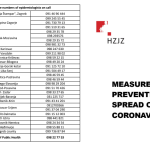The pandemic has led to a significant increase in the number of workers taking sick leave. More than a million citizens have been infected with the coronavirus in the last two years, and as of yesterday, 21,865 people were in isolation.
Although some of them only have mild symptoms and continue to work from home, a good number of people are forced to take sick leave. However, although it is clear to auditors from the Croatian Health Insurance Fund (HZZO) that taking time off for this reason is justified, GPs are being reprimanded for the amount of sick leave they’ve been approving, reports Vecernji list/Romana Kovačević Barišić.
‘My allowed rate of sick leave is 2.8%, and I had 5.5%. The [HZZO] audit did not find any irregularities, but I received a warning for exceeding the rate nonetheless. I didn’t want to sign it, but I was informed that I was putting my contract in jeopardy. I filed a complaint. It was accepted, but it was also confirmed that my exceeding the sick leave rate was unjustified as I signed a contract with the HZZO stating that I would adhere to the stated rate as a contractual obligation. And the pandemic isn’t mentioned anywhere in the contract’, said Marija Gluhak MD, a family doctor from Međimurje, describing her case from November last year.
In case of repeated warnings, the practitioners are first subject to a fine, followed by a possible termination of their contract with the HZZO.
Dr. Vesna Potočki Rukavina MD has seen her contractual sick leave rate of 2.5% increase to 4.9% in the last two months.
‘Omicron has caused a considerable increase in acute sick leave. It mostly affects the younger part of the workforce and inevitably excludes them from work obligations, and HZZO does not look at the situation in the field objectively, so they reprimanded some of my colleagues’, said Dr. Potočki Rukavina. She hasn’t received a warning despite having exceeded the mentioned contractual rate, which only points to the absurdity of a dry bureaucratic approach which is devoid of logic and uneven across the board.
The HZZO point out that they have an obligation to monitor and control the Temporary Incapacity for Work (TIW) of the insured to see whether the status is justified, and to do so both on a regular basis and in exceptional circumstances.
‘Temporary incapacity for work caused by isolation and illness related to COVID-19 is determined and managed in accordance with the epidemiological measures and guidelines recommended by the Croatian Institute for Public Health and the Civil Protection Headquarters, and cannot be considerably affected by audit. In January 2022, there were 11,303 recorded new cases of isolation or self-isolation due to COVID-19. We can say with certainty that the number is even higher in reality, but many who are isolating or self-isolating in agreement with their employers avail of the option of working from home, take vacation days or paid leave without exercising the right to request the TIW status, so the HZZO doesn’t have them in their records.
Regular audits of TIW leave are intended to monitor long-term TIWs and those TIWs that are determined to last too long given the medical diagnosis on which they are based’, stated HZZO and also brought up the fact that keeping the sick leave rate within the strategic parametres contributes to the rational spending of limited resources of the health care system.
Health Minister Vili Beroš recently again encouraged patients to report it if they cannot get hold of their GPs. Between November 2020 when the email address zovem.doktora@hzzo.hr was introduced and the end of January 2022, HZZO received a total of 2697 emails from the insured, 928 of which were determined to be justified complaints.
In 2021, they received 1682 complaints, and between January 1st 2022 and February 9th 2022 there were 457 complaints.
According to the HZZO, the majority of received complaints focused on inaccessibility of service, namely the inability of patients to establish timely contact with primary health care practitioners.
The way this is handled is the HZZO employees immediately look into the allegations listed in the complaints, get in touch with primary care clinics (by phone or e-mail), inform the doctor who supervises the team about the need for a call back to the insured person in question, and get back to the insured persons to inform them of the outcome, stated the HZZO.
The overworked doctors are not taking these accusations lightly. ‘If all clinics have a problem with inaccessibility, we obviously have a bug in the system’, commented Dr. Ivana Babić MD.
Dr. Potočki Rukavina agrees with her colleague. ‘The situation is absurd. If all 2,200 of us combined received a total of ten million calls and e-mails in the first three quarters of last year, I don’t know if this is a question of unavailability as much as it’s a problem of over-availability! Always being available to this extent is a danger to our work. Is it possible to do comprehensive, quality work in the two or three minutes that you have for each patient?! And if you process 150 of them, you’ll most likely be unavailable for the 151st’, said the doctor.









